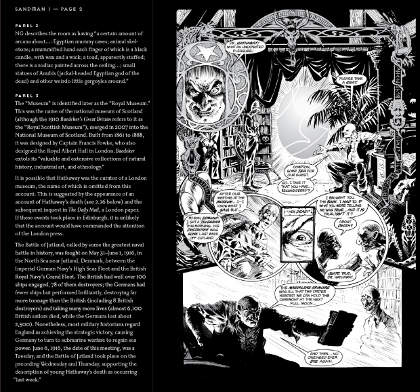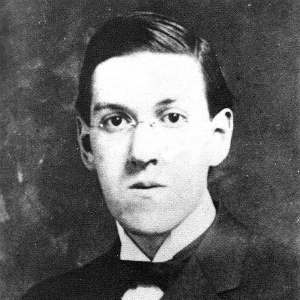lospaziobianco.com has talked with Leslie Klinger about The Annotated Sandman. Klinger’s research exploits the original scripts, consultation of Gaiman’s archive and conversations with Gaiman himself. The Annotated edition comments on almost each Sandman page, and explores the origin of scenes, objects and characters that appear in Gaiman’s tale.
 Annotated edition is a very peculiar one. Did Vertigo have any doubt about the economical side of such a project?
Annotated edition is a very peculiar one. Did Vertigo have any doubt about the economical side of such a project?
The project happened because Neil Gaiman suggested it. I think that Vertigo thought that ANYTHING Sandman would sell. I had my own doubts about whether DC Entertainment would go forward with the project even after they paid me, but they stood by the plan, and they are committed to all 4 volumes, maybe even 5!
Well, according to estimated selling figures for the new Sandman Overture, about 100.000 copies.
I have no idea how many copies of Vol 1 were sold, but that’s good for the comic!
Annotated comes in b/w: this makes it a product suitable for readers who already have a coloured Sandman edition, i.e. no new readers: why did you choose for b/w?
Yes, we discussed the alternative of color, but it would have made the books too expensive. Retail of US$ 50 is already a lot: color would have been close to $100. Moreover, some people have told me that they really like the b/w format, because they can see more details that get lost in color.
 I agree, e.g. the Sam Kieth run. So: who is an Annotated Edition for (I am sure you know it very well)?
I agree, e.g. the Sam Kieth run. So: who is an Annotated Edition for (I am sure you know it very well)?
It is designed to make the experience of reading Sandman better for every reader, by showing them the richness of the work. I think of it as a “director’s commentary” or “bonus track” on a DVD. Everyone who enjoys reading Sandman should really enjoy reading the notes!
But don’t you think that such an apparatus results in making the reader focus on the “hows” and not on the “whys”, i.e. how The Sandman grew up and not on the sense of such a work?
You are correct that I have made no effort to write as a “critic.” I don’t want to tell anyone what the stories “mean” or why we cry when we read them or what response a reader should have. I’m trying to enrich the reader’s experience by making sure that the reader understands (a) what various references actually mean and (b) what “facts” laid out in the stories are historically accurate. I’ve also occasionally asked a question for the reader to consider: for example, who is Rose Walker’s father?
And that “trick” crates a sort of augmented reading experience, as the book asks you something!
Yes. And I always tell first-time readers to read the story before they read the notes.
I think it must be very exciting to work at this kind of project: something like to throw a look into the author’s magical box of ideas. Was Gaiman collaborative, or sometimes he felt you like a sort of Peeping Tom?
No, he was very collaborative. We spent a lot of time talking about my research and his own. One of my favorite stories is, in fact, about the Rose Walker’s father question. I did my analysis and asked Gaiman what he thought. He scratched his head and said that he really didn’t know, but that he liked my theory and I should go for it!
 Great moment indeed!
Great moment indeed!
Of course in this respect it was totally different from my experience in annotating the Sherlock Holmes stories or Dracula: I would have had to use a medium to contact those authors!
It would be exciting, in its way…
And Conan Doyle actually claimed to have “spoken” with Jack London after the latter was dead, and ACD published the “interview.”
Well Conan Doyle had a great passion about spiritism!
Indeed he did.
About Gaiman’s collaboration: do you talk with him as your work goes on or have you collected ideas and hints from him at the start of the project?
We met as recently as three weeks ago [i.e. early December 2013] to go over volume 3.
And what does he remember of his Sandman period? Is he re-discovering his own work?
Yes, in many cases he has had to go back and re-read the scripts to check some things.
The scripts: I wonder why has not Vertigo published the scripts yet!
A few have been published, but I don’t think Gaiman would want them all published. Some of the material is very personal, and in a very few cases he’s asked me not to use some material that he thought in retrospect was so.
I think that Annotated Editions are typical for Literature Classics.
And Sandman is destined to be a “Literature Classic”!
 And I think also that the Comics World (fan, authors, critics) suffers a sort of inferiority complex towards “written” literature. So, dont’you think that your work gratifies the comics world desire to be considered part of the high culture? (I rememeber what happened when Gaiman won the World Fantasy Awards with A Midsummer Night’s Dream).
And I think also that the Comics World (fan, authors, critics) suffers a sort of inferiority complex towards “written” literature. So, dont’you think that your work gratifies the comics world desire to be considered part of the high culture? (I rememeber what happened when Gaiman won the World Fantasy Awards with A Midsummer Night’s Dream).
I hope so! Certainly the critics called Sandman a classic. It’s a long process to attain this kind of recognition. I recall that Watchmen was on a list of 100 best novels of the 20th century!
Gaiman loves to tell a story about going to a cocktail party (during the run of Sandman) with a bunch of high-brow, snooty New York people. He was introduced to a man as a comic-book writer, and the man quickly moved on to other more important guests. Later in the party he came back to Gaiman and said “Why didn’t you tell me that you wrote GRAPHIC NOVELS!” Now he was interested!
I remember the anecdote. My point is that I would expect comics to obtain recognition as a language capable of telling stories; i.e. I am perplexed when some says (as a matter of fact) that “comics/graphic novel are literature with another name”. I mean: noone says that about movies.
I’m sorry that the industry doesn’t take itself more seriously. I was disappointed that Vol. 1 wasn’t nominated for any industry awards (although it was nominated for a Bram Stoker Award by the Horror Writers Association for “Best Nonfiction”). I like the view that comics books are a medium, not a genre.
Has your point of view on Sandman changed while you were working on it?
Yes, definitely. When I read “Sandman” for the first time, I found it very moving, very effective story-telling, but: (1) I didn’t get a lot of the DC Universe references (I’d been away from comics for a while), (2) I was unsure about some of the historical references, and (3) I didn’t know much about Scandinavian or Japanese mythology. For that matter, even though I was an English major in college, I’d never done any historical research on Shakespeare. Reading it to annotate it opened my eyes to a lot of great stuff and tremendously increased my appreciation for the quality of the work.
The Annotated Edition counts two published volumes so far: when is the third scheduled?
Volume 3 is now set for October 2014. And in that same period my next book, New Annotated H.P. Lovecraft, is to be published by W. W. Norton.
Interwiew collected by chat on December 26 2013







